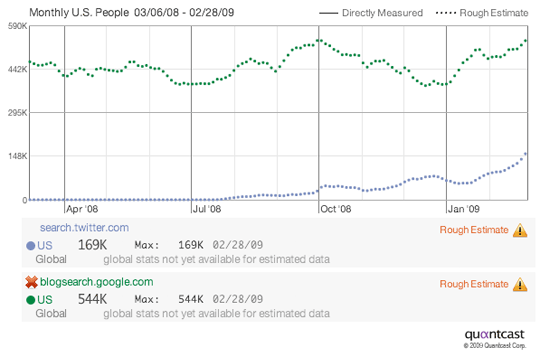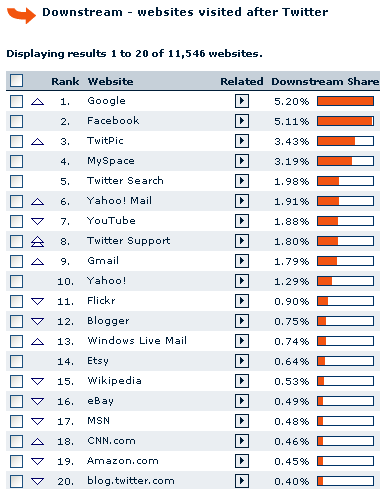Twitter’s Traffic Growth & The Rise Of Social Search

There’s a lot of stats and analysis today about Twitter’s traffic, how it compares to other social search sites, and who’s benefiting from all the traffic Twitter can send. It seems no one argues that Twitter is on the rise, but just how high it’s risen is still up for debate. Let’s start, appropriately, with […]
Let’s start, appropriately, with a tweet: comScore posted a note that Twitter’s February traffic was up 55% over January. (We don’t see a formal release of this data yet, but will update when we do.) 55% is nothing to shake a stick at; it’s serious growth.
Steve Rubel dug into Twitter Search traffic (i.e., to search.twitter.com) today, and suggests that it’s about to surpass traffic to Google Blog Search:
 Steve’s numbers come from Compete.com, which show Twitter Search getting 1.35 million visitors per month, slightly less than Google Blog Search’s 1.38 million. But other data services don’t show the same thing. Here’s how Quantcast — a service that some believe is generally more accurate — compares Twitter Search and Google Blog Search:
Steve’s numbers come from Compete.com, which show Twitter Search getting 1.35 million visitors per month, slightly less than Google Blog Search’s 1.38 million. But other data services don’t show the same thing. Here’s how Quantcast — a service that some believe is generally more accurate — compares Twitter Search and Google Blog Search:
 There’s no way to know which is correct without seeing actual data from Twitter and Google (don’t hold your breath…), so it’s anyone’s guess if Twitter Search is close to surpassing Google Blog Search. But from looking at the charts above, it doesn’t seem at all farfetched to think it will happen at some point in the future.
There’s no way to know which is correct without seeing actual data from Twitter and Google (don’t hold your breath…), so it’s anyone’s guess if Twitter Search is close to surpassing Google Blog Search. But from looking at the charts above, it doesn’t seem at all farfetched to think it will happen at some point in the future.
Meanwhile, Hitwise’s Heather Hopkins was also writing about Twitter today, but more specifically about where people go from Twitter.
Somewhat surprisingly (to me, at least) the Hitwise data shows Google as the largest recipient of Twitter traffic … and no, that doesn’t include traffic to YouTube (which I thought would be much higher than seventh):
 Another thing worth mentioning is Heather’s comparison of traffic categories. She says Twitter’s clickstream doesn’t send as much traffic to shopping and educational sites (like Wikipedia) as search engines do. It sends more traffic to other social network sites and to personal blogs/web sites than search engines do.
Another thing worth mentioning is Heather’s comparison of traffic categories. She says Twitter’s clickstream doesn’t send as much traffic to shopping and educational sites (like Wikipedia) as search engines do. It sends more traffic to other social network sites and to personal blogs/web sites than search engines do.
In that sense, Twitter itself behaves just like you’d expect it to — like a social network. But the growth of Twitter Search, as evidenced by the charts and data above, suggests that Twitter is moving into a different realm, somewhere between social networking and search, and perhaps bringing together the best of both worlds. Social search, as Steve Rubel says in his piece today, “adds a much needed layer of trust to traditional search that helps us qualify sources.”


